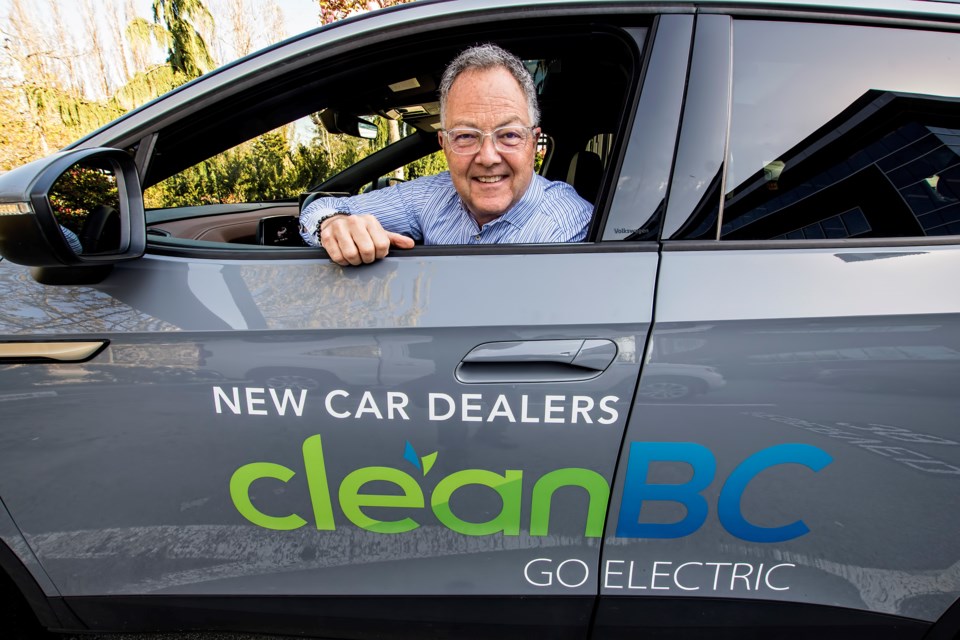B.C.’s legislated mandates for zero-emission vehicle sales in the province will push ownership costs higher with help from U.S. and Canadian trade action, says the industry association that represents new car dealers in British Columbia.
Weak demand for ZEVs, ambitious targets for ZEV sales and tariffs will be devastating for purchasers, argues Blair Qualey, CEO of the New Car Dealers Association of BC.
“This is a freight train of pain coming at B.C.’s consumers,” said Qualey. “We need to try and find some way to not be penalizing the manufacturers, because the demand is just not there for electric vehicles.”
Qualey said the provincial government should boost demand rather than punish supply, and support customers who want to opt for an electric vehicle. This can be done, he said, by implementing rebates, building more electric vehicle charging infrastructure and educating people on the advantages of EVs.
“It just seems to me to be a no-brainer for the B.C. government to say, look, we’ve pulled the plug on the carbon tax, we’re going to put a pause on this mandate,” said Qualey.
B.C.’s Zero-Emission Vehicles Act, which was passed in May 2019, set targets for automaker EV sales in the province.
By 2026, 26 per cent of light-duty vehicles, or those weighing up to 4.5 tonnes, sold by automakers in B.C. must be zero-emission vehicles. That threshold increases to 90 per cent of sales by 2030 and 100 per cent by 2035, according to the province.
Qualey said manufacturers who fail to meet these targets will face a $20,000 penalty for each gas vehicle sold above these thresholds. This could mean that if EV demand in the province does not reach these percentages, manufacturers will have to reduce the number of gas-powered vehicles available for sale to avoid penalties, he said.
“As we all recall from COVID, when the supply of vehicles was constrained, prices went up both for new vehicles and used vehicles,” said Qualey. “Some [manufacturers] have already started indicating to our dealers that they are going to reduce the availability of vehicles in British Columbia this year.”
He explained this will mean higher prices for consumers that want or need a gas vehicle — like those living in rural parts of the province.
EV demand is only one challenge facing Canada’s auto sector, which is vulnerable to trade action from the U.S. and retaliatory measures from Ottawa.
On April 2, U.S. President Donald Trump announced a 25-per-cent tariff on Canadian automobile imports and parts. The following day, Prime Minister Mark Carney announced Canada would match those tariffs, except for auto parts.
At that time, Qualey said the precise implications of the tariffs on B.C.’s auto industry were still unknown. However, he also said costs could likely increase and the availability of some brands could be affected.
A March 31 survey by Autozen Technology Ltd. suggested that 61 per cent of British Columbians are concerned about finding reasonable used-car options amid the U.S.-Canada trade war.
The survey by the Vancouver-based online vehicle marketplace also showed that 73 per cent of respondents were concerned about finding reasonable new car options. Out of the 800 survey participants, 30 per cent have also changed their decision about a major purchase like a house or car because of ongoing political tensions.
Qualey said that, even without tariffs, the lack of availability and pricing challenges in all vehicle classes as a result of B.C.’s ZEV mandate is a significant issue that could be painful for consumers — particularly in areas where mobility and transportation alternatives to vehicles may not be viable, he said.
At the moment, the availability of EVs in the province is not an issue, and some dealerships have months’ worth of vehicles sitting in their lots, according to Qualey. While the EV category did well with early adoption, several factors make it challenging to convert new consumers to zero-emission options, he said.
“Now we’re to the big bunch in the middle … who ask — how much is this going to cost? Where am I going to charge it? Is there going to be enough electricity?” Qualey said. “We are asking government to be realistic and have a look at what’s happening in the market and with consumers.”



